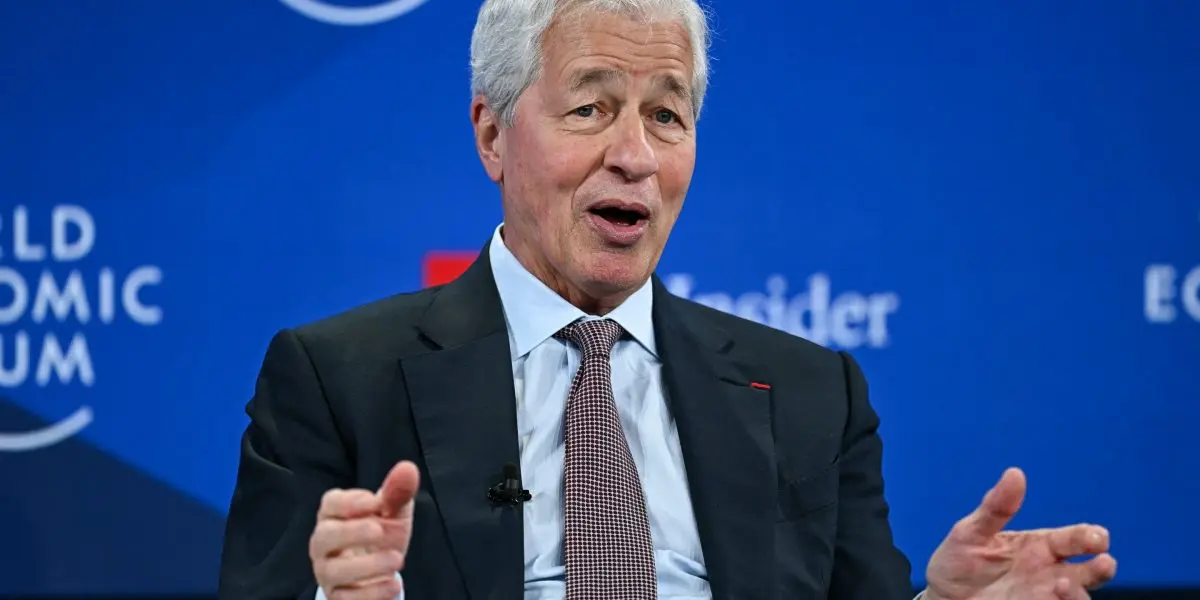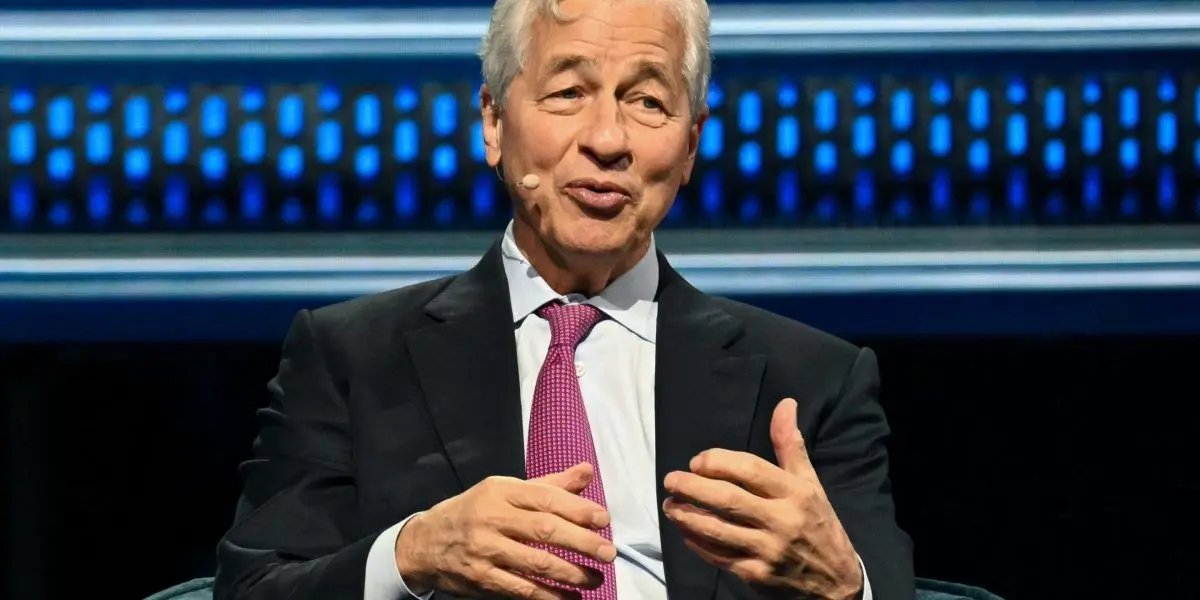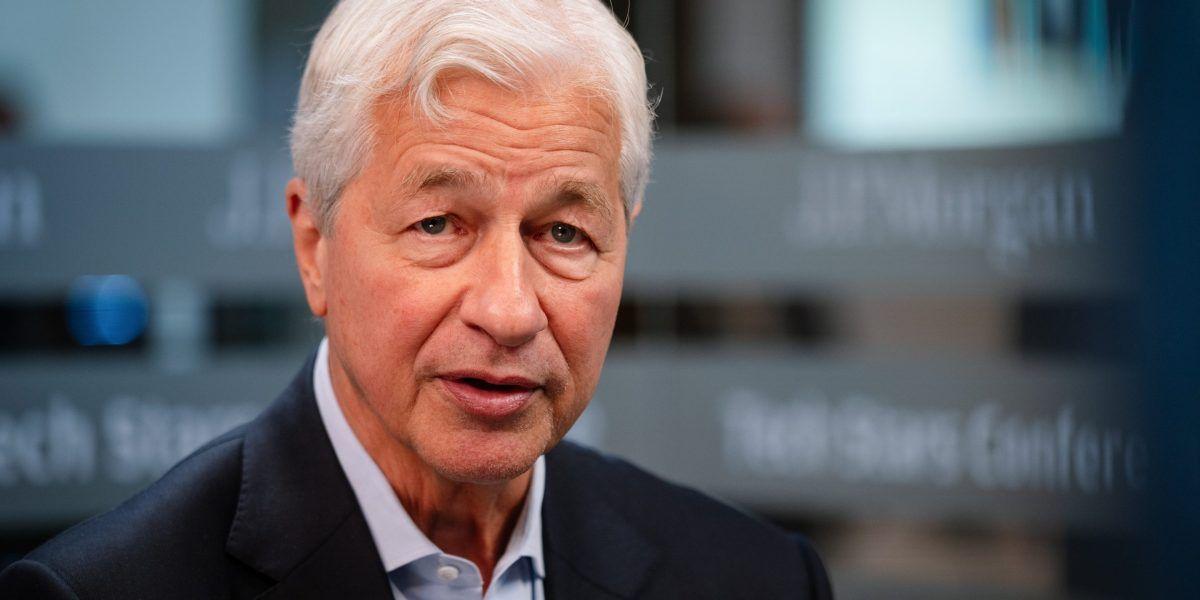JPMorgan CEO Jamie Dimon Warns of Geopolitical Risks and Trade Reconfiguration
2 Sources
2 Sources
[1]
Trade set for recast over security: Dimon - Times of India
JP Morgan CEO Jamie Dimon believes too much attention is being placed on US Fed's rate cut's size, which he views as largely inconsequential. In an interview with TOI, Dimon said inflation and hard-landing risks persist. Excerpts. Exactly a year ago, you spoke about the risks of interest rates rising to 7% and recession. Do you think something went right as rates did not go up and recession was averted? As a businessperson, you should be prepared for various scenarios.You can't just assume that the expected scenario will happen. I still think there's a chance rates could stay higher for longer. I'm talking about the 10-year rate, which is 3.8%, but could it go up? Yes. Could company borrowing costs rise due to credit spreads? Yes. So, as a business, you prepare for various outcomes. So far, it looks like we're heading for a soft landing, but you'll only know when it's over. Do you think the 50bps rate cut signifies that the risk of a downturn is higher? How do you see rate cuts playing out on the dollar? Some people speculate that they made the cut because they're more worried about a downturn, but I don't know. You'll have to ask them. What we want is a strong economy. If they're reducing rates to keep the economy strong, that would be good for the dollar. If there's a recession, that's a whole different scenario. I can't predict the future. I'm hoping it's okay, but a year from now, you'll be telling me what happened. I don't know, you don't know, and (Jerome) Powell (Fed chief) doesn't know. Do you think the Fed will succeed in managing a soft landing? If you look at stock and bond markets, credit default spreads seem to be pricing in a 70-80% chance of a soft landing. I think the odds are lower than that. I'm a bit more sceptical due to the extremely complex geopolitical situation and extreme fiscal spending globally. It seems to have had no consequences yet, but I hope the soft landing happens. Do you see inflation risks continuing? They're coming down, but when I look at the future environment, certain things are almost guaranteed - more military spending worldwide, the cost of transitioning to a green economy, restructuring trade, ongoing fiscal deficits, and an ageing population. All of these are inflationary. It seems likely inflation could tick up over time. A recession would reduce it, while a boom would increase it. But those factors will still be there. Post-pandemic, geopolitical risks seem to have increased. What does this mean for globalisation? The world is complex, and while China has become a big country, the concerning events are the war involving Russia and ongoing military action in the Middle East. China isn't involved in these conflicts but isn't aligned with the US either, which makes the situation more difficult. I don't think globalisation will disappear. You can come up with a schematic dividing the world into two major trading blocs, but that's not in anyone's interest, and it would take a long time. Instead, you're likely to see a restructuring of trade for national security reasons. Every country has different interests - India needs oil, America doesn't. So, each country will secure what it needs. For the US, that includes pharmaceutical ingredients and rare earths. The second restructuring will focus on fair trade. Some countries use state-owned enterprises to dominate global trade, and that is a beggar-thy-neighbour approach. I think countries will become more sensitive to what's fair. What is the future for banking jobs with the rise of digital tech and AI? Digital technology has been around for a long time, and jobs have increased, not decreased. While certain types of jobs may be reduced, others will change. In our branches, we have more advisers and fewer in operational and teller roles. There's more in wealth management, small business banking, mortgages, etc. AI will make jobs more productive and, in the short term, create new jobs. In fact, we're hiring more people in AI and data science. Any plans for retail banking in India? I've always said no to a physical bank. If Chase came here, there's no real reason for you to bank with us. You don't know us, and there are very capable banks already here. Plus, we'd need to build a whole infrastructure - legal, risk, credit, compliance, audit systems. However, our Chase brand is building a digital-only bank somewhat successfully in the UK. We plan to roll it out in another country next year. If it's successful, it could expand into Europe, and eventually into Asia. But that's still many years away. What are the lessons from last year's banking crisis? The banks had two problems, and they were isolated to a handful of institutions. One was very concentrated deposits. Think of venture capital companies controlling many corporate accounts and asking them to move their money all at once. That was a new problem - billions of dollars left Silicon Valley Bank, and similar amounts at First Republic in days. The other issue was interest rate exposure, which was reported, isolated and transparent to both boards and regulators, but they took on too much of it, and it shouldn't have been allowed. That was a lesson for everyone. When First Republic failed, we knew it would be the last domino because of those issues. But, I was careful as this was provided we don't have a recession, and we had higher rates which put stress on some banks and leveraged companies. Regulators are re-examining liquidity and deposit cover requirements... The movement of money electronically isn't new. The internet has been around for a long time, but banks didn't experience those kinds of runs before. Banks had certain problems, but they had a diversified clientele, which is why they didn't face the issues First Republic did.
[2]
Geopolitics is far more important than interest rates in US and Japan: JPMorgan CEO Jamie Dimon
Geopolitics, rather than finance itself, would determine the direction of the global economy in the immediate future, says Jamie Dimon, Chairman & CEO, JPMorgan. The US dollar will remain the dominant monetary unit, Dimon tells Sangita Mehta, MC Govardhana Rangan and Sruthijith KK., in an exclusive interview, underscoring the greenback's undiminished importance as the world's reserve currency. Edited excerpts: The Federal Reserve has moved after two years with a rate cut. Has it engineered a soft landing? It looks that way, but I'm a little cautious in that. I think they did the right thing to reduce rates. Fifty basis points is probably the right thing to do. The underlying economy still is chugging along. But remember, they're just also reacting to the economy chugging along. Prices have been coming down nicely. So far, so good. So here we have a situation where the US and Japan are moving in opposite directions on rates. What does it mean for capital flows in global financial markets? It's just a normalisation. Japan is still kind of zero, and they're moving up a little bit. They need a real rate of return. But at the end of the day, the real thing that's gonna drive flows will be growth in the economies, and not just the interest rate. And every country is in a different position with regards to money supplies, growth, and inflation. What does it mean for the global capital flows? Because the yen carry trade has been one of the best plays for so many years. Is the worst behind us? What's in store in the swaps market? I think a lot of that trade has been unwound. It worked for a very long time, and obviously it won't work if rates are going up in Japan. I wouldn't call that a risk, I think the real risk I look at now is geopolitical stuff. That dwarfs all other things. And to me, geopolitics is far more important for mankind than interest rates in Japan and the United States. Israel has joined Ukraine, and Hezbollah and Lebanon... how do you see it evolving? But oil prices have been benign despite the wars... Ukraine has gotten worse. The missiles and the bombardment are getting worse. Iran, the Houthi attacks on American ships in the Red Sea. These are very dangerous situations. But oil prices are falling. Have the dynamics changed? Oil and gas prices are set by supply and demand. It also include sentiment and inventory. So put it all together, it's in oversupply today. Europe had to change their flow due to Ukraine. This is a great lesson when we talk about the importance of safe, secure, reliable, affordable energy. If you look down the road, there'll probably be undersupply of oil. That's maybe a year or two away. You said geopolitical risk is what is a big concern right now. The next big event that could influence all of these in different ways is the US elections. How do you see it? I think American policy regarding Israel will stay roughly the same - supporting Israel, and pushing for peace . And Ukraine, it sounds like there it might be different policies, but I don't think either candidate is advocating that we leave Ukraine. There's a lot of noise about recession - the US, Europe and a slowing China... Obviously, China's slowed down. But will they kind of recover and pick up? Possibly. But India is doing well. America continues to do well. We haven't seen anything like that for a couple of years. I've never seen people perfectly pick the inflection points of the economy. The economy is a very large, complex, multi-faceted beast. For example, JP Morgan moves $10 trillion a day. Investors are making decisions, every single day, people are going to work, sending kids to schools and buying food - that's what drive the economies. You mean, India is probably doing better than most? I think you guys here have done a fabulous job at that. Your Aadhaar system, the banking accounts, reforming the GST, building national infrastructure, reducing regulations. These things help the country and help lower-income folks, in addition to the wealthy. How do you look at India with an ambition to be a $7-trillion economy in relation to our financial markets? Very bright. To give you a bit of perspective, my first trip to India, was in 2005. I had just become the CEO of JP Morgan. And I went to a small building in the old financial district. And I think we did research on 15 or 20 companies. Today, we do research on close to 140 companies which helps educate the world about Indian companies. We bank 850 multinationals here. We've got close to 55,000 employees in the Corporate Centre supporting our global operations and our technology. It' s engineering, cyber, tech, data, AI. We are building out a robust payment systems here for clients . And all these things you're doing are gonna make you grow more. And it's achievable. And you need strong leadership, as you have with PM Modi. The government has a reduced majority now. Does that affect how you see India? Not really. The government, democracy is that way, right? So any democracy you operate in, you have to understand it may move around a little bit, like American democracy.
Share
Share
Copy Link
Jamie Dimon, CEO of JPMorgan Chase, highlights the increasing importance of geopolitics in global trade and finance. He warns of potential trade reconfigurations and emphasizes the need for businesses to adapt to changing geopolitical landscapes.

Geopolitics Takes Center Stage in Global Finance
Jamie Dimon, the CEO of JPMorgan Chase, has issued a stark warning about the growing influence of geopolitics on global trade and finance. In recent statements, Dimon emphasized that geopolitical factors are now "far more important than interest rates" in major economies like the United States and Japan
1
.Trade Reconfiguration on the Horizon
Dimon predicts a significant reconfiguration of global trade patterns, driven by security concerns rather than purely economic factors. He suggests that countries are increasingly likely to trade with nations they consider allies, potentially reshaping long-established trade relationships
2
.India's Strategic Position
The JPMorgan CEO highlighted India's unique position in this changing landscape. He noted that India, with its strong ties to both Western nations and Russia, could play a pivotal role in the evolving global trade dynamics
2
.Economic Outlook and Challenges
Despite geopolitical tensions, Dimon expressed optimism about the U.S. economy's resilience. He pointed out that the American economy has shown strength, with low unemployment rates and robust consumer spending. However, he cautioned that high interest rates could pose challenges, particularly affecting lower-income households
1
.Corporate Strategy in Uncertain Times
Dimon advised businesses to prepare for various scenarios, including potential "black swan" events. He stressed the importance of maintaining strong balance sheets and being prepared for unexpected geopolitical developments that could impact global markets
1
.Related Stories
The China Factor
China's economic and geopolitical role was a key point in Dimon's analysis. He suggested that while China's reopening post-COVID could boost global growth, ongoing tensions between China and the West could lead to further trade reconfigurations
2
.Long-term Perspective on Interest Rates
While acknowledging the current focus on interest rates, Dimon emphasized that over the long term, geopolitical factors would likely have a more significant impact on global trade and economic patterns than monetary policy decisions
1
.Adapting to a New Global Order
Dimon's insights underscore the need for businesses and policymakers to adapt to a world where geopolitical considerations increasingly shape economic decisions. This shift could have far-reaching implications for global supply chains, investment strategies, and international partnerships
2
.References
Summarized by
Navi
Related Stories
Jamie Dimon warns AI rollout may need to slow down to prevent civil unrest and job disruption
22 Jan 2026•Business and Economy

JPMorgan's Jamie Dimon Predicts AI Will Reduce Workweek to 3.5 Days While Maintaining Employment
06 Nov 2025•Business and Economy

Jamie Dimon's Reality Check on AI: Bubble Concerns, Job Disruption, and Long-Term Potential
15 Oct 2025•Business and Economy

Recent Highlights
1
Google Gemini 3.1 Pro doubles reasoning score, beats rivals in key AI benchmarks
Technology

2
ByteDance's Seedance 2.0 AI video generator triggers copyright infringement battle with Hollywood
Policy and Regulation

3
ChatGPT cracks decades-old gluon amplitude puzzle, marking AI's first major theoretical physics win
Science and Research





